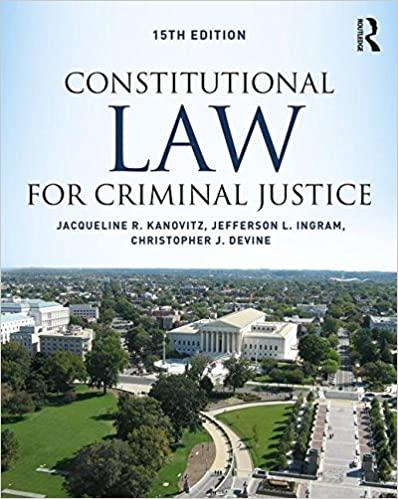Question
Rv Chen, 2010 ONCJ 641, [2010) OJ No 5741 THE BUSINESS CONTEXT: The retail industry loses a considerable amount of inventory to shoplifters every year.
Rv Chen, 2010 ONCJ 641, [2010) OJ No 5741
THE BUSINESS CONTEXT: The retail industry loses a considerable amount of inventory to shoplifters every year. For example, the Retail Council of Canada (in 2012) estimated that "shrink rates" in Canada (i.e., retail theft rates)
translated to approximately $4 billion in annual losses to retailers. Though the problem of inventory shrinkage is therefore rampant, store owners and employees who encounter shoplifters must be careful not to violate the Criminal Code or commit the torts of false imprisonment, assault, and battery (discussed in the previous section of this chapter).
FACTUAL BACKGROUND: David Chen, owner of Lucky Moose Food Mart in Toronto, and some of his employees were charged with assault and forcible confinement (under the Criminal Code) after they chased down a shoplifter, tied him up, and held him in a delivery van to await the arrival of the police. The shoplifter, convicted thief Anthony Bennett, had arrived at Chen's store earlier that same day. Surveillance cameras showed him loading up his bicycle with product and then leaving without paying. As reported in the press, Bennett testified during Chen's trial that he had stolen plants from Chen's store and decided to return to the store one hour later to steal more product from Chen. This same media account notes that, during that return t rip to the store, Chen asked Bennett to pay for the plants he had previously taken. Bennett refused, cursed Chen with a racist epithet, and then ran away. It was at this point that Chen and his employees gave chase, eventually confining Bennett to a van. According to Crown prosecutor Eugene McDermott, in a statement to the media:
Of course shopkeepers are entitled to protect their property. Of course they are entitled to arrest people in the terms of Article 494 (the justification or citizen's arrest provisions of the Criminal Code!. But that's not what happened in this case. He (Chen} seized a person oft the streets. tied him up. and threw him in the back of a van. Once again. nobody calls the police. There are a number of points that beggar belief.
By way of contrast, Chen's lawyer argued that tying up the shoplifter, Bennett, and holding him in the van was similar to department store
personnel bringing a shoplifter to a back room to wait for the police.
THE LEGAL QUESTION: Were Chen and his employees entitled to make a citizen's arrest under section 494 of the Criminal Code or are they guilty of the criminal offence of forcible confinement and assault? In the context of making a citizen's arrest, can they rely on section 25 of the Criminal Code?
RESOLUTION. The court concluded that Chen was entitled to make a citizen's arrest under s 494 becal\Se he had found Bennett committing
a theft on the video tape. Section 494 of the Criminal Code states: "Anyone may arrest without warrant: A person whom he finds committing an indictable offense." That Chen purported to arrest Bennett one hour laterwhen Bennett brazenly returned to steal more product from the Lucky Moose--was perfectly fine, said the court, because he regarded the original theft and Bennett's subsequent return as "one transaction."
An important related issue was whether Chen had brought himself within section 25 of the Criminal Code which provides that, in making a citizen's arrest, one is only entitled to use "as much force as is necessary" for that purpose. According to Chen's evidence, he had to tie up Bennett because Bennett was kicking and punching. He did not want to let Bennettgo, but instead wanted to get back to his store so he could call the police. Bennett gave an entirely clifferent account of events, suggesting, inthe court's words, that "he stood by meekly as they [Chen and his employees]laida beating on him." Based on this and otl1er incongruities, the court expressed concern about the creclibility of the evidence offered by Mr. Bennett, Mr. Chen, and his employees. The court ultimately entered a verdict of not guilty against the accuseds because, accorcling to the judge:
It is impossible for me to say that l am satisfied on the material evidence before me that I know what happened that day. lt follows
therefore that the only conclusion that I can come to is that I have a reasonable doubt. All such doubts must always be resolved in the favour of the defence.
In the meantime, Chen has advised the meclia that he will no longer attempt a citizen's arrest:"! [will] just take the picture and call the
police", he said.
According to the case above, please answer:
1.To what extent should shop owners be entitled to protect product in their store?
2.Will the amendment to theCriminal Code lead to vigilantism?
Step by Step Solution
There are 3 Steps involved in it
Step: 1

Get Instant Access to Expert-Tailored Solutions
See step-by-step solutions with expert insights and AI powered tools for academic success
Step: 2

Step: 3

Ace Your Homework with AI
Get the answers you need in no time with our AI-driven, step-by-step assistance
Get Started


